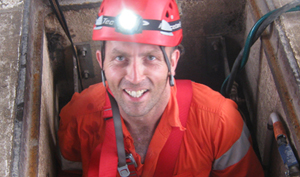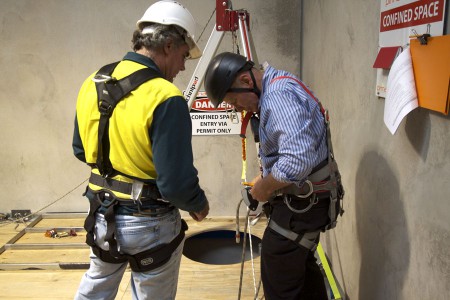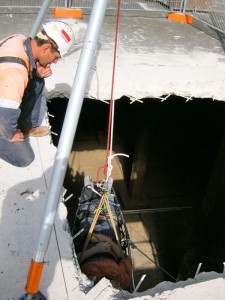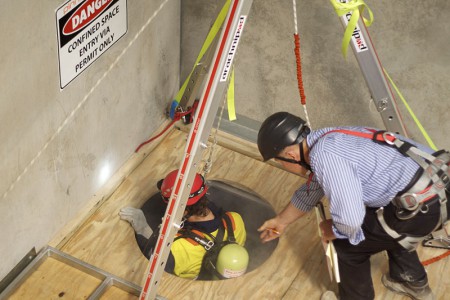No region selected
Confined Space Entry - 2 day
Face to Face
Covers basic confined space entry skills, along with more advanced confined space training, including gas testing and the issuing of confined space entry permits. 100% face-to-face training.

Course Dates
| Location (Gold Coast) | Start Date | Places Left |
|---|---|---|
| Gold Coast - Helensvale | Tue, May 07, 2024 (7:30am) |
5 Places Left
Book Now |
| Gold Coast - Helensvale | Wed, May 29, 2024 (7:30am) |
Places Available
Book Now |
| Gold Coast - Helensvale | Tue, Jul 02, 2024 (7:30am) |
Places Available
Book Now |
| Gold Coast - Helensvale | Tue, Jul 30, 2024 (7:30am) |
Places Available
Book Now |
| Gold Coast - Helensvale | Thu, Aug 22, 2024 (7:30am) |
Places Available
Book Now |
Course Details
Certification
Students who are deemed competent will receive a Statement of Attainment recognised under the Australian Qualifications Framework. This certification is nationally recognised. The Statement is issued by Pinnacle Safety and Training (RTO 40496).
National units of competency
- RIIWHS202E - Enter and work in confined spaces
- MSMPER205 - Enter confined space
- MSMPER200 - Work in accordance with an issued permit
- MSMWHS217 - Gas test atmospheres
- MSMWHS201 - Conduct hazard analysis
- MSMPER300 - Issue work permits
Course Details
Course duration: 2 days (approximately 8 hours per day)
Up to 12 trainees per course
Price
- $438.00 pp for public courses
- For group bookings outside our public course schedule or at your location, please submit your group booking enquiry here for an obligation free quote.



Course Overview
“Should I do the 1 day course or this 2 day course?”
Our Confined Space Entry 2 day course is for:
- Anyone who wants a greater depth of knowledge of working in confined spaces
- Anyone who needs a ‘gas test atmospheres’ certification in order to be able to operate a gas detector
- Anyone who wants to be able to issue confined space work permits
- Anyone who may need to supervise other workers during confined space operations.
This course covers everything from our regular Confined Space Entry 1 day course, with an extra day for the content and practical activities relating to roles and responsibilities of the team, the confined space risk assessment process, gas testing and issuing permits.
General Overview
This nationally recognised training course is designed for people who work in or around confined spaces. The course can be tailored to suit your company’s specific training requirements focusing on the safety procedures and practical scenarios relevant to your particular confined space operations. While there is a standard set of learning outcomes for the course, we understand that the context and environment in which the learning is applied is varied. It is designed to teach participants how to:
- Identify and control confined space hazards
- Work safely within confined spaces
- Review and assess a range of confined space permit applications
- Issue entry permits for confined space operations
- Undertake gas testing procedures and interpret readings
- Monitor compliance with issued confined space permits
- Address and report non-compliances with permit conditions
If you need to be able to operate breathing apparatus, please see our Operate Breathing Apparatus course.
Likewise, if you need to be able to undertake confined space rescue, please see our Confined Space Rescue course.
What is a Confined Space?
According to the Safe Work Australia Code of Practice, a “confined space” means an enclosed or partially enclosed space that:
- is not designed or intended primarily to be occupied by a person; and
- is, or is designed or intended to be, at normal atmospheric pressure while any person is in the space; and
- is or is likely to be a risk to health and safety from:
- an atmosphere that does not have a safe oxygen level, or
- contaminants, including airborne gases, vapours and dusts, that may cause injury from fire or explosion, or
- harmful concentrations of any airborne contaminants, or
- engulfment.
Examples of confined spaces include (but are not limited to):
- Storage tanks
- Tank cars
- Process vessels
- Pressure vessels
- Boilers
- Silos and other tank-like compartments
- Pits and degreasers
- Pipes
- Sewers
- Sewer pump stations including wet and dry wells, shafts and ducts
- Shipboard spaces entered through small hatchways or access points, cargo tanks, cellular double bottom tanks, duct keels, ballast or oil tanks and void spaces.
This course is recommended for
- Confined space supervisors
- Regular confined space workers
- Electrical engineers
- Safety inspectors
- Safety personnel
- Injury prevention personnel
- Maintenance personnel
- Emergency services personnel (fire, ambulance, police)
- WHS officers
- Risk managers
- Mine managers
- Telecommunications and cable installation personnel
- Lift operators and installers
- Transport industry workers
- Utility industry workers.
Course Outline
- Identifying confined spaces
- OHS legislation, Compliance Codes and Australian Standards relevant to confined spaces
- Roles and responsibilities of management and employees
- Hazard identification, risk assessments and hierarchy of controls
- Issuance of confined space permits
- Work site policy and procedures
- Isolation procedures
- Atmospheric monitoring and gas detection
- Working at height and fall protection equipment
- Safety and emergency procedures
- Practical entry into a confined space
Currency of Training
Australian Standard AS2865 recommends refreshing confined space training every 12-24 months.
Course Inclusions
- Two 8 hour days of face-to-face training conducted by an experienced confined space specialist
- Hands-on practical training designed to develop safe work practices
- Knowledge of relevant legislation, codes of practice and Australian Standards relevant to confined spaces
- Recommendations and advice for specialised PPE and equipment for your workplace
- Advice on risk control methods for the type of work to be undertaken
Each Trainee Must Provide
Participants must
- Be at least 18 years of age
- Wear suitable attire (including long pants and closed-in shoes)
- Provide their own lunch and transport
- Have a sufficient level of reading, writing, numeracy and oral communication to undertake this training, including the ability to:
- read and interpret documentation relevant to the confined space entry permits
- write clearly in English to complete workplace forms
- speak clearly and understand verbal communication in English
- understand gas concentration measurements and interpret gas testing results
- explain and respond to a range of workplace scenarios
Equipment
- We supply all equipment necessary for you to undertake training, however we actively encourage you to bring along your own equipment.
- Working at Heights and Confined Space Combined
- Confined Space Entry - Online Theory + Half Day Practical
- Confined Space Entry - 1 day
- Confined Space Entry - 2 day
- Confined Space Permit Issuer
- Confined Space Awareness
- Confined Space Rescue
- Gas Testing Training
- Operate Breathing Apparatus
- Risk Control Training
Training was excellent, the level of knowledge the trainer had about the subject was great. The practical component was very well done, it gave a real insight into how what you were learning would be used in the field. The smaller class size allowed the trainer to give each individual the time they required to gain a full understanding of the course. Having spent a substantial amount of years in the Construction/Maintenance field, it was very refreshing to participate in training that wasn’t run with the aim of simply ticking a box. The trainer showed a commitment to ensuring everyone in the class would be completely able to go out into the work site & apply what they were learning with a good grasp on the responsibilities that come along with performing the task. It was a well run course & it was an enjoyable to attend.
Sharlene G. - Sydney, NSW
CPB Contractors
Great trainer for the course, Lester did a great job of keeping me involved and interested which would not have been easy as I have done this course twice before. I came out of the course with a greater knowledge and understanding of what a confined space ticket allows me to do/not to do. I have been in my industry for over 10 years, so to say I learnt something new about something I do every day is great and I put that down to Lester’s training methods.
Joel M. - Brisbane, QLD
Kleenduct AustraliaStudent Links
I found Kerryn to be an excellent trainer and presenter who was able to share her industry experience well. The fact that she regularly provides Confined Spaces services to industry reflects well.
